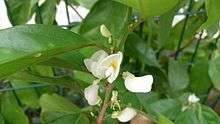Baphieae
| Baphieae | |
|---|---|
 | |
| Baphia nitida | |
| Scientific classification | |
| Kingdom: | Plantae |
| (unranked): | Angiosperms |
| (unranked): | Eudicots |
| (unranked): | Rosids |
| Order: | Fabales |
| Family: | Fabaceae |
| Subfamily: | Faboideae |
| (unranked): | Meso-Papilionoideae |
| Tribe: | Baphieae (Yakovlev 1991) Cardoso et al. 2013[1] |
| Type genus | |
| Baphia | |
| Genera | |
|
See text. | |
| Synonyms | |
| |
The tribe Baphieae is one of the subdivisions of the plant family Fabaceae. The Baphieae tribe arose 55.3 ± 0.4 million years ago (in the early Eocene).[2]
Genera
The Baphieae tribe has been circumscribed to include the following genera, which used to be placed in tribes Sophoreae and Swartzieae:[1][3][4][5][6][7][8]
- Airyantha Brummitt
- Baphia Afzel. ex Lodd. et al.
- Baphiopsis Benth. ex Baker
- Baphiastrum Harms
- Bowringia Champ. ex Benth.
- Dalhousiea Wall. ex Benth.
- Leucomphalos Benth. ex Planch.
This clade does not currently have a node-based, phylogenetic definition. Members of the Baphieae exhibit the following synapomorphies:
…free stamens and poorly differentiated lower petals, or flowers sometimes appearing radially symmetrical,…simple or unifoliolate leaves, anthers more or less basifixed, and the calyx splitting to the base either down one side only and so appearing spathaceous, or down both sides and so becoming bilabiate.[7][8]
References
- 1 2 Cardoso D, Pennington RT, de Queiroz LP, Boatwright JS, Van Wyk B-E, Wojciechowski MF, Lavin M. (2013). "Reconstructing the deep-branching relationships of the papilionoid legumes". S Afr J Bot. 89: 58–75. doi:10.1016/j.sajb.2013.05.001.
- ↑ Lavin M, Herendeen PS, Wojciechowski MF. (2005). "Evolutionary rates analysis of Leguminosae implicates a rapid diversification of lineages during the tertiary". Syst Biol. 54 (4): 575–94. doi:10.1080/10635150590947131. PMID 16085576.
- ↑ Pennington RT, Lavin M, Ireland H, Klitgaard B, Preston J, Hu J-M. (2001). "Phylogenetic relationships of basal papilionoid legumes based upon sequences of the chloroplast trnL intron". Syst Bot. 55 (5): 818–836. doi:10.1043/0363-6445-26.3.537.
- ↑ Wojciechowski MF, Lavin M, Sanderson MJ. (2004). "A phylogeny of legumes (Leguminosae) based on analysis of the plastid matK gene resolves many well-supported subclades within the family". Am J Bot. 91 (11): 1846–862. doi:10.3732/ajb.91.11.1846. PMID 21652332.
- ↑ Ireland HE. (2005). "Tribe Swartzieae". In Lewis G, Schrire B, MacKinder B, Lock M. Legumes of the world. Kew, UK: Royal Botanic Gardens. pp. 214–225. ISBN 1900347806.
- ↑ Pennington RT, Stirton CH, Schrire BD. (2005). "Tribe Sophoreae". In Lewis G, Schrire B, Mackinder B, Lock M. Legumes of the World. Royal Botanic Gardens, Kew. pp. 227–249. ISBN 1900347806.
- 1 2 Cardoso D, de Queiroz LP, Pennington RT, de Lima HC, Fonty É, Wojciechowski MF, Lavin M. (2012). "Revisiting the phylogeny of papilionoid legumes: new insights from comprehensively sampled early-branching lineages". Am J Bot. 99 (12): 1991–2013. doi:10.3732/ajb.1200380.
- 1 2 "Sophoreae p. p. 8". Legumes of the World. Kew Royal Botanic Gardens. Retrieved November 2, 2016.
This article is issued from Wikipedia - version of the 11/7/2016. The text is available under the Creative Commons Attribution/Share Alike but additional terms may apply for the media files.